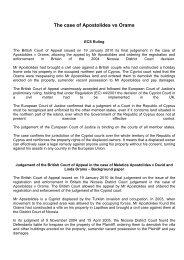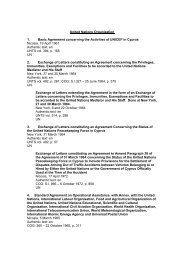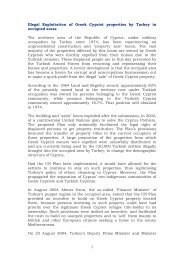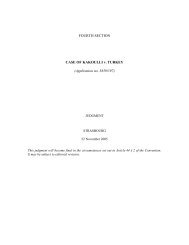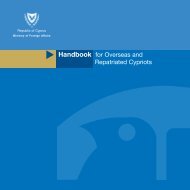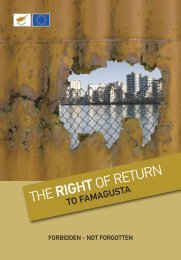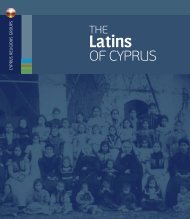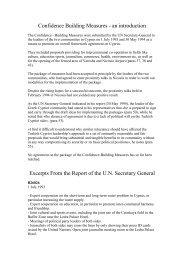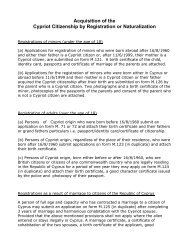Myra Xenides- Arestis v. Turkey
Myra Xenides- Arestis v. Turkey
Myra Xenides- Arestis v. Turkey
Create successful ePaper yourself
Turn your PDF publications into a flip-book with our unique Google optimized e-Paper software.
XENIDES-ARESTIS v. TURKEY DECISION 17for the constitutional division of the island of Cyprus on the basis ofeffective ethnic separation with major restrictions on the freedom ofsettlement, effective discrimination, confiscation of properties, deprivationof homes, denial of political rights and condemnation of war crimes, forexample, the settlement of occupied territories through the transfer ofcivilian population from <strong>Turkey</strong>, an occupying state. In this connection,they draw the Court's attention to the draft principles on the refugees' rightto return and to restitution of their properties by the UN Sub Commission onthe Promotion and Protection of Human Rights.Even though the rejection of the Annan Plan means that it is “null andvoid” in accordance with Article 1(2) of Annex IX to the FoundationAgreement, the Cypriot Government submit that it is that the respondentGovernment aims to involve the Court in political questions relating to theplan and its rejection by the Greek-Cypriot electorate in an attempt topersuade the Court, being heavily over-burdened with pending claims, tocompel Greek-Cypriot applicants to have recourse to the ineffective andpartial remedies contained in the “TRNC Law”.(d) The Court's assessmentThe Court recalls that in the case of Loizidou v. <strong>Turkey</strong> the Courtdismissed the respondent Government's preliminary objections as to<strong>Turkey</strong>'s alleged lack of jurisdiction and responsibility for the acts in respectof which complaint was made (Loizidou v. <strong>Turkey</strong>, merits, op. cit., §§ 39-47and 49-57). In that same judgment the Court rejected the respondentGovernment's objection ratione temporis and recognised the continuingnature of the alleged violations of Articles 8 of the Convention and 1 ofProtocol No. 1 (op. cit., §§ 39-47). It further rejected their argumentsregarding the effect which the Court's consideration of the applicant's claimscould have on the inter-communal talks as well as on those concerningfreedom of movement (op. cit., §§ 60-64). These findings were confirmedby the Court in its judgment of 10 May 2001 in the case of Cyprus v. <strong>Turkey</strong>(op. cit., §§ 75-81, 173-175 and 184-189, ECHR 2001-IV). The Courtrecalls that in its latter judgment it rejected the respondent Government'sarguments according to which it had erred in its approach to the issuesraised by the Loizidou case, especially on the matter of <strong>Turkey</strong>'s liability foralleged violations of Convention rights, including allegations of continuinginterferences with the right to respect for home and property rights underArticles 8 of the Convention and 1 of Protocol No. 1 occurring within the“TRNC”, as well as on the question of the relevance of the inter-communaltalks to the Court's examination of such allegations (op. cit., §§ 75-81, 173-175 and 184-189; see also Demades v. <strong>Turkey</strong>, no. 16219/90, §§ 29-37 and44-46, 31 July 2003; and Eugenia Michaelidou Developments Ltd andMichael Tymvios v. <strong>Turkey</strong>, no. 16163/90, §§ 28-31, 31 July 2003).





